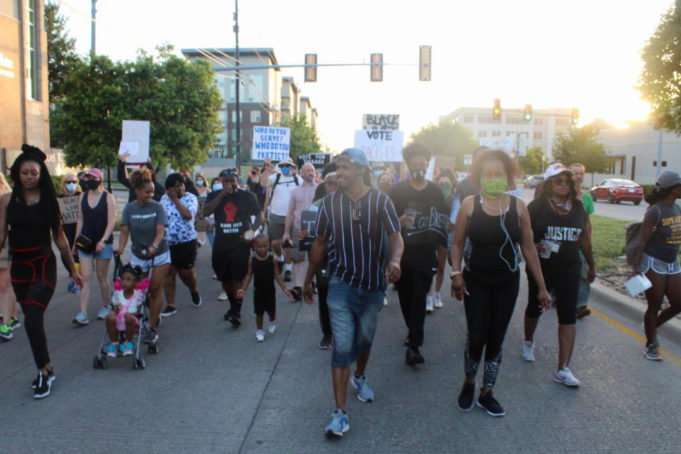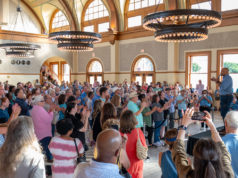The recent announcement of a trial date for Aaron Dean is yet another reminder of how long police accountability can take. It’s been nearly two years since the former Fort Worth police officer shot and killed Atatiana Jefferson, a Black woman, while she played video games with her nephew in the Southside home she shared with her mother. As Dean’s trial begins in November, supporters of police accountability will concurrently follow the courtroom proceedings and the city’s handling of a proposed Community Police Oversight and Accountability Board.
More than 160 cities and counties have implemented civilian oversight of police through review boards, according to the National Association for Civilian Oversight of Law Enforcement, a nonprofit that works to improve and promote civilian oversight of police.
The process of creating Fort Worth’s community review board began in 2018 when the city-appointed Race and Culture Task Force proposed police oversight as one of 22 recommendations to address inequality and racial tensions in Fort Worth. Based on those recommendations, in early 2020, Fort Worth City Council created the Office of the Police Oversight Monitor to review police policies and citizen complaints and to reach out to the community to learn what a Fort Worth police community review board should look like. Kim Neal, who heads the police monitor office, convened a volunteer group of community stakeholders in December to draft proposals for a police community review board. The group met every two weeks for several months through the first part of this year.
Pamela Young, lead organizer for the Tarrant County Coalition for Community Oversight (TCCCO), itself a coalition of reform-minded groups, said local grassroots organizations and many Fort Worth residents see independent oversight of Fort Worth’s police department as the most important recommendation to come out of the Race and Culture Task Force. Young worries that special interests and Fort Worth’s historic love of maintaining the status quo will squander the types of meaningful police oversight reforms that Dallas, Austin, and many other major Texas cities have already implemented.
Young’s worries are far from unfounded. City leaders recently backpedaled on a key recommendation of the Race and Culture Task Force — the formation of an independent redistricting council to oversee city council redistricting following the recent release of U.S. Census findings (“ City Officials Backpedaling on Promises?” Jan. 28). Ongoing redistricting efforts are being led by a city council-appointed task force, a process that many see as inherently plagued by conflicts of interest. In June, our readers were reminded of the lengths Fort Worth police department’s Office of Internal Affairs will go to when covering up misconduct by high-ranking officers (“ Shedding Light on Misconduct,” July 21).
Last week, police monitor Neal presented a draft of community review board recommendations during a city council work session. Her current recommendations do not allow the proposed community review board to review citizen complaints against police, which goes against common practice. The main purpose of independent police oversight is to allow residents to review and investigate documented incidents of police misconduct. The proposed 15-member volunteer board would be appointed by city councilmembers for the purpose of collaborating “with the police monitors and Fort Worth police department to develop a more transparent police department through review of and recommendations of Fort Worth police department policies, practices, and procedures.”
Councilmember Chris Nettles, whose recent campaign centered on police reform, scoffed at the largely symbolic powers that Neal, based on the working group’s recommendations, proposed to city leaders.
“To look at procedures and policies, that’s what your office does,” Nettles said, referring to Neal’s position as police monitor. “This board needs to look at complaints as well as policy and procedure. This is not what we asked for. I’m not going to support this. If this is what we’ve been working on for the last year, you guys have wasted money, time, and effort. This has disappointed me.”
Young, who was a member of the working volunteer group that labored from late December through July to draft the recommendations that Neal presented during the city council work session, said several problems plagued the working group from the beginning.
For one, the working group was directed by city leaders to draft oversight proposals that centered on police policy, not investigative powers, she said.
By comparison, Dallas’ review board works closely with its Office of Community Police Oversight, which is similar in function to Fort Worth’s police monitor office. Dallas’ review board and office of police oversight have investigative powers that include the ability to “subpoena civilians and require officers to provide a statement,” according to the City of Dallas’ website.
Early on, Young alleges, Fort Worth city staff lied about the legality of civilians requesting police personnel files.
Neal’s decision to bring the draft recommendations to city council before they were presented to the community is a worrisome sign of how the entire process appears to put city interests over the community interests, Young added. TCCCO members presented City Manager David Cooke with a working group proposal that called for public discussions before any police community review board proposals were presented to the mayor and city council.
Community meetings would have allowed residents to voice concerns about the police community review board proposals, which are largely powerless in their current form, Young said.
Nettles told us that Neal will update the proposals to include a civilian review of police complaints. The councilmember said he would also like to empower the police community review board to have subpoena powers over civilians, but he is willing to drop that requirement if it helps garner broader councilmember support.
Nettles said he is frustrated that the process avoided consideration of a police review component, but he understands that Neal was dealing with a more conservative city council last December when she began her work in earnest.
The new city council has “been in office for 105 days,” Nettles told us. “The prior council did not have any excitement about moving in this direction. Her ability to [consider police conduct investigations by civilians] was not allowed to happen.”
Mayor Mattie Parker has repeatedly stated over the past few months that she would not weigh in on the topic until Neal made more formal proposals. Speaking to the Fort Worth Report last week, Parker said she is not ready to support the proposals because a lot of confusion remains over the scope and powers of the police community review board. Parker’s recent mayoral campaign benefited heavily from support from Fort Worth’s police union.
“Neal does have the capacity to do investigations that are submitted to her office outside of the internal affairs process that the Fort Worth PD has,” Parker said. “Those processes are already in place on behalf of citizens.”
We reached out to the police monitor’s office for official figures on how many police officers have been disciplined as a direct result of a police monitor investigation. The Office of the Police Oversight Monitor “has not conducted any independent investigations,” Neal said in an email.
Young said that an empowered civilian oversight board should have the power to review both the police department and police monitors. The recent election of councilmembers Elizabeth Beck, Jared Williams, and Nettles has given Fort Worth its first real opportunity for police oversight, she added.
“I’m hopeful that this council, especially these new councilmembers,” will enact meaningful accountability for both the police and police monitors, Young said.
Nettles said last week’s work session meeting wasn’t a total setback. Once Neal gives an updated presentation that include a civilian-led review component, Nettles said he will call for the item to be placed on a city council meeting agenda. By March 2022, the 15-member board could begin work investigating police misconduct. Fort Worth’s police chief would still retain the authority to discipline police officers as warranted, but the civilian board would issue its own independent findings that would be made public, Nettles said.
“Other major cities are doing citizen review the way that we’re refusing to,” Nettles said. “I’m trying to be a force to wake” up city leadership.












